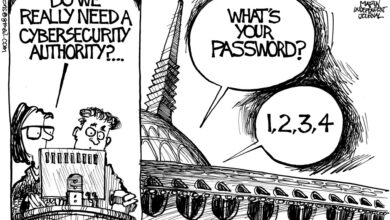The Cybersecurity Implications Of Gen Z’s Tech-Savvy Lifestyle

Gen z friends holding smartphone outside. Blue sky.
The evolving lifestyle of Generation Z has significant implications from a cybersecurity perspective. As digital natives born into an era of rapid technological advancement, their habits, preferences, and interactions with technology shape not only market trends but also the landscape of cybersecurity. Let’s explore how Generation Z’s habits intersect with cybersecurity and what the challenges and solutions are in this area.
Digital-First Communication
Gen Z prefers online platforms for communication, including social media, instant messaging apps, and video calls. This reliance on digital channels increases the risk of exposure to phishing attacks and privacy breaches. Cybersecurity education focused on these risks is essential for this generation. It is crucial to regularly update software and use strong, unique passwords for each account to enhance security across various platforms and services.
Mobile Device Usage
With smartphones being the primary device for Gen Z, mobile security has become a paramount concern. In addition to the above online risks, mobile devices carry additional ones that have to do with unsecured Wi-Fi networks, mobile malware, and risky app downloads. There is a need for robust mobile security solutions and awareness about secure mobile practices. Gen Z should be encouraged to enable multi-factor authentication on all devices and apps where available. Providers should ensure their apps undergo rigorous security testing and promote end-to-end encryption to safeguard both data in transit and at rest.
Online Gaming
Gen Z’s enthusiasm for online gaming and e-sports exposes them to specific cybersecurity threats, such as account hacking, game-related scams, and doxxing. Protecting online gaming environments and educating young users about safe gaming practices are critical cybersecurity concerns. Game developers and service providers should implement robust verification methods and real-time monitoring to detect and respond to suspicious activities quickly. Parents and educators should foster an environment of open communication about cyber risks, encouraging young gamers to report any suspicious behavior or breaches immediately.
Privacy-Conscious Behavior
While Gen Z is active online, they also show a heightened awareness of privacy issues. They value cybersecurity features that protect their anonymity and personal data. This awareness drives demand for advanced privacy and security laws and solutions. Tech solutions may include the use of VPNs, encrypted messaging apps, and tweaking privacy settings on various online platforms. Companies should offer comprehensive user controls that allow individuals to manage their data more effectively, enhancing trust and compliance with privacy regulations. Educational initiatives that inform users about the implications of data sharing and the importance of regular privacy audits can empower Gen Z to take proactive steps in safeguarding their online presence.
The Gig Economy and Remote Work
Gen Z’s inclination towards freelance work and remote job opportunities highlights the need for secure remote access solutions, awareness of secure data handling practices, and protection against the risks associated with using personal devices for work purposes. Organizations employing remote workers, including freelancers, should provide cybersecurity training that includes best practices for using personal and company devices securely. Remote access software should be configured correctly to ensure that only authorized users can access sensitive information and systems.
Emerging Technologies and Changes in Lifestyle Choices
Gen Z’s rapid adoption of technologies such as IoT devices, wearables, AR/VR, and trends like electronic cigarettes impacts their cybersecurity. They prefer online shopping and digital payments, heightening risks such as fraud and identity theft. The popularity of electronic cigarettes, especially from top-tier vape brands like Voopoo, underscores the need for secure online transactions. Everest Zhao, CEO of VooPoo, advocates for consumer rights and online privacy. He drives VooPoo to establish effective privacy measures while implementing underage protection policies. Voopoo enforces age restrictions and verifies ages in promotions to protect minors and comply with legal standards. Their robust data protection strategies include encryption and secure networks, showcasing their leadership in industry security standards. Additionally, Voopoo uses machine learning to identify unusual patterns or behaviors, providing early warnings of potential security threats or breaches.
Educational Platforms and Online Learning
With a strong inclination towards online courses and digital educational resources, there is a necessity to secure educational platforms against breaches, protect student data, and ensure the integrity of online learning environments. Academic institutions should implement regular security audits and vulnerability assessments to identify and mitigate potential risks in their digital learning platforms. Students and educators need to be trained in recognizing modern social engineering attacks and other common cybersecurity threats.
Activism and Social Engagement
Gen Z uses digital platforms for activism and social engagement, making them targets for attacks aimed at suppressing dissent or spreading disinformation. Activists should use secure communication channels to organize and share sensitive information, safeguarding their conversations from unauthorized surveillance and interception. Platforms hosting activist content must enhance their monitoring systems to identify and mitigate targeted attacks and disinformation campaigns quickly. It is important to always verify the credibility of sources before sharing content, utilize fact-checking services regularly, be skeptical of sensational headlines, and cross-reference news with multiple trusted outlets.
Conclusion
As Gen Z drives innovation and demands personalization across various sectors, there is an essential need for robust cybersecurity measures. These measures must protect personal information from unauthorized access and theft, secure transactions, and prevent scams. Understanding the evolving lifestyle of Generation Z from a cybersecurity perspective requires us to acknowledge their unique interactions with technology. This recognition leads to the development of advanced, user-friendly cybersecurity solutions and training programs tailored to their habits, concerns, and expectations.



